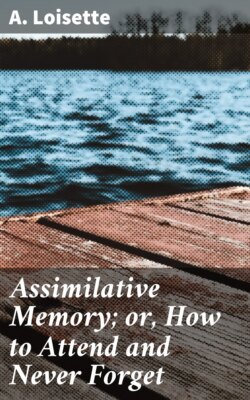Читать книгу Assimilative Memory; or, How to Attend and Never Forget - A. Loisette - Страница 11
На сайте Литреса книга снята с продажи.
THIRD AND LAST LAW OF MEMORY.
ОглавлениеTable of Contents
Good Princess. Pocahontas. } In. & Con.
A proper name as such has little meaning. It is usually a mere sound to which the person that bears it answers as the dog responds to the name “Carlo.” It is a sound which we call a name, and which we apply to one person to distinguish that person from all others, as in this case Pocahontas is used to distinguish the daughter of Powhattan from all other Indian women. She knew who was meant when that name was applied to her. But the name Pocahontas does not indicate that she was wise or unwise, learned or unlearned, tall or short, old or young. In saving the life of Capt. John Smith she became entitled to be called a “Good Princess.” In this case it would be In. by G. & S. We have heard of all this, and now when we think of Pocahontas, we are apt to remember that she was a good Princess for saving Smith’s life. The connection between these words I call Concurrence. We have thought of these words together, and the mind by its own operation has cemented them together, so that when we think of one it is apt to make us remember the other. Concurrence means that which has been accidentally, or as cause and effect, conjoined in our experience. Between the words or ideas thus conjoined, there is, strictly speaking, neither Inclusion or Exclusion. Whenever there are unrelated things which the mind holds together simply because it has occupied itself with them, then we have a case of concurrence to be represented by Con. Other examples: “Harrison, Tippecanoe;” “Columbus, America;” “Washington, Cherry Tree;” “Andrew Jackson, To the Victors belong the Spoils;” “Newton, Gravitation;” “Garfield, Guiteau;” “Gladstone, Home Rule,” &c.
Pocahontas. Capt. John Smith. } Con.
We have read the story of the rescue of Smith by Pocahontas. We have thought of these names together and they have united in our memories by the Law of Concurrence. When we recall the name of Pocahontas, we are apt to revive also the name of Capt. John Smith and vice versa. Another case:—A gentleman was present at Ford’s Theatre in Washington when John Wilkes Booth shot Abraham Lincoln. Just a moment before, he recognised the odour of a hyacinth held by a lady in front of him. The next moment he heard the fatal shot, and turning whence the report came, he saw the murderous result. After the lapse of a quarter of a century, he could not smell, see, or think of hyacinth without at once thinking of that scene, nor could Lincoln’s assassination be mentioned in his presence without his instantly thinking of hyacinth. Nothing could have been more purely accidental than the quick succession of the sensation of the odour and the murder of the President. But they were experienced together or nearly together. They became cemented together, so that the revival of one is apt to call up the other, and this is concurrence.
